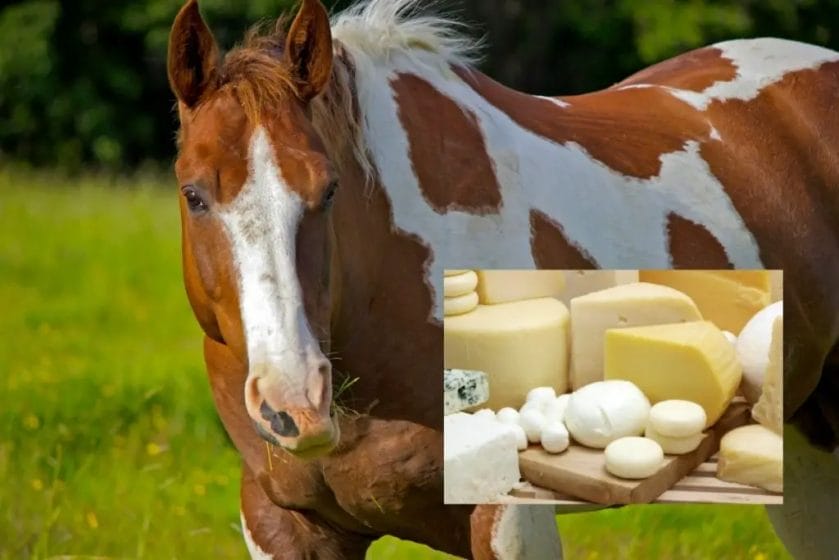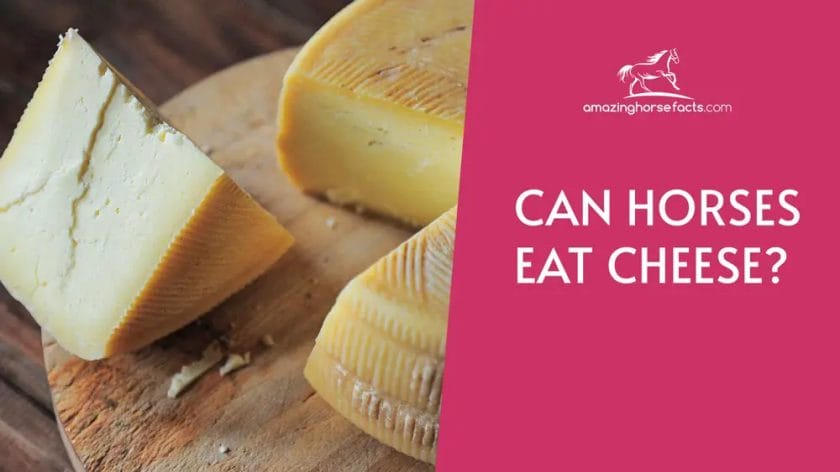Horses, being herbivores, have different dietary requirements than humans. While cheese is a beloved snack for many people, it is not recommended for horses.
Their digestive system is not designed to process dairy products, and it may cause gastrointestinal issues.
It’s important to provide horses with a balanced diet consisting of hay, grass, and specially formulated horse feed to ensure their optimal health and well-being.

What is cheese?
Cheese is a dairy product that is made from milk. It is produced by coagulating the milk proteins, which causes the formation of curds. These curds are then processed and aged to give cheese its distinct flavor and texture. Cheese comes in many varieties and is a popular ingredient in numerous dishes around the world.
Can horses eat cheese?
While horses are herbivores and primarily feed on grass and hay, they can tolerate small amounts of certain non-toxic foods. Cheese, however, is not considered a natural part of a horse’s diet. It is not recommended to feed cheese to horses regularly, as it can have adverse effects on their health.
Potential risks of feeding cheese to horses
Feeding cheese to horses can pose several risks to their health:
- Digestive issues: Horses have a delicate digestive system that is designed to process fibrous plant material. Cheese, being a high-fat and high-protein food, can be difficult for horses to digest properly, leading to gastrointestinal problems such as colic.
- Weight gain: Cheese is calorie-dense, and excessive consumption can contribute to weight gain in horses. Maintaining a healthy weight is essential for a horse’s overall well-being and performance.
- Allergic reactions: Horses may have allergies or sensitivities to certain ingredients present in cheese, such as lactose or specific types of cheese. These allergic reactions can manifest as skin irritations, digestive issues, or respiratory problems.
- Imbalance in nutritional intake: Horses have specific dietary requirements that need to be met through a balanced and varied diet. Feeding cheese, which is not nutritionally tailored for horses, can disrupt this balance and lead to deficiencies or imbalances in essential nutrients.
Alternatives to cheese for horses
To provide treats or supplements for horses, it is advisable to choose options that are safe and nutritionally appropriate. Some alternatives to cheese for horses include:
- Carrots: Carrots are a popular and safe treat for horses. They are low in calories and provide essential vitamins and minerals.
- Apples: Apples are another favorite among horses. They are a good source of fiber and contain vitamins and antioxidants.
- Peppermints: Peppermints can be given as an occasional treat. However, they should be sugar-free to avoid any potential negative effects on the horse’s teeth and overall health.
- Commercial horse treats: There are various commercially available treats specifically designed for horses. These treats are formulated to meet their nutritional needs while providing a tasty reward.
In summary, while horses can tolerate small amounts of certain non-toxic foods, cheese is not recommended as a regular part of their diet. Feeding cheese to horses can pose digestive issues, contribute to weight gain, and lead to allergic reactions. It is important to choose safe and nutritionally appropriate alternatives when providing treats or supplements for horses.

Can horses eat cheese?
No, horses should not eat cheese. Cheese is not a natural part of a horse’s diet and can be harmful to their digestive system. It can cause digestive upset, colic, and other health issues. It’s best to stick to feeding horses a balanced diet of hay, grass, and horse-specific feeds.
Conclusion
In conclusion, horses should not be fed cheese as it is not a natural part of their diet. While horses are herbivores and can consume a variety of plants, fruits, and vegetables, cheese is a dairy product that may not be easily digestible for them. Feeding horses foods that are not suitable for their digestive system can lead to health issues such as gastrointestinal upset or even colic. It is important to provide horses with a balanced diet that includes high-quality forage and appropriate supplements, as recommended by a veterinarian or equine nutritionist. Always prioritize the horse’s well-being and consult a professional for specific dietary recommendations.
